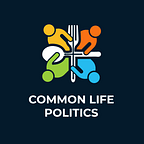In response to reactions to On the Strange Beauty of Ugly Legislation.
The House just passed the legislation I analyzed in today's and yesterday’s essays by a narrow margin—making this theological critique of 'fiscal fundamentalism' more urgent than ever.
I. The New Beatitudes™
Available exclusively from Trump Brand Theology, alongside the Trump Bible, Fight Fight Fight cologne, and other premium spiritual products
Blessed are the tax cutters,
for they shall inherit the deficit.Blessed are those who detention centers build,
for they shall be called peacemakers.Blessed are the prosperity theologians,
for theirs is the kingdom of statistical manipulation.
Now available in gold-plated verse format! Each beatitude personally endorsed by the man who never met a product he couldn't slap his name on, from steaks to universities to sacred scripture. Coming soon: Trump Brand Holy Water ("The wettest water you've ever seen, from the standpoint of water") and the MAGA Communion Set ("Make the Eucharist Great Again").
I've been receiving the most fascinating correspondence lately—letters that reveal the full flowering of what we might call "Fiscal Fundamentalism," a theological mutation that treats Republican budget proposals as if they were divinely revealed scripture. The arguments are so remarkably consistent across different writers that I suspect there's either a shared talking points memo or the Holy Spirit has begun communicating exclusively through Heritage Foundation policy briefs.
These letters invariably follow a predictable pattern: personal testimony about economic struggle, statistics that would make even a casino operator blush, immigration rhetoric that would have puzzled the Magi (Matthew 2:1-12), and theological arguments that manage to make the prosperity gospel look sophisticated by comparison. It's rather like watching someone perform theological gymnastics while claiming they're simply walking in a straight line.
What's particularly fascinating is not merely the content of these defenses, but their systematic deployment of what classical rhetoric calls ignoratio elenchi—the art of missing the point so skillfully that it appears intentional. This represents Tribal Epistemology in action: truth-seeking systematically subordinated to group identity maintenance, where the goal isn't understanding but tribal boundary preservation. When confronted with arguments about mass family detention, they respond with questions about tourism visa requirements. When pressed about healthcare cuts affecting millions, they pivot to abstract discussions about work requirements. This isn't accidental confusion—it's strategic misdirection, the rhetorical equivalent of a magician's sleight of hand.
On Method and Approach
Before proceeding to specific analysis, a brief word about methodology. This essay focuses primarily on theological rather than purely economic critique—not because economic analysis is unimportant, but because the defenders of these policies consistently invoke Christian authority for their positions. When people claim divine endorsement for human policies, theological evaluation becomes not just appropriate but necessary.
The approach here follows what we might call "immanent critique"—taking seriously the Christian commitments that fiscal fundamentalists claim while examining whether their policy preferences actually align with those commitments. This isn't about imposing external religious standards on secular policy debates, but about evaluating whether policies advocated in Christ's name actually reflect Christ's character (John 14:9).
The economic data matters because truth matters, and because false claims about policy effects can't be baptized into righteousness through religious rhetoric. But the deeper question remains theological: what does it mean to follow Jesus in the realm of public policy, and how do we distinguish authentic discipleship from Christianism—the use of Christian symbols to legitimize fundamentally unchristian content?
§
II. The Alchemy of Austerity
The most remarkable rhetorical achievement in these defenses is the transformation of taking from the poor to give to the rich into a form of Christian charity. This requires what medieval alchemists could never accomplish: turning base metals into gold through pure force of will and statistical sleight of hand.
Consider the curious mathematics at work. When pressed about cutting healthcare for 8.6 million people while providing $3.8 trillion in tax cuts for the wealthy, our fiscal theologians deploy what we might call "Prosperity Materialism Accounting." They cite revenue increases of 48% (a figure from House Budget Committee Republicans comparing nominal 2022 revenues of $4.9 trillion to 2017 baseline without adjusting for inflation, population growth, or economic expansion—precisely the statistical sleight of hand that would make casino operators blush)¹, unemployment decreases (without acknowledging trends that began years before their preferred policies), and wage growth (without noting that real wages adjusted for inflation tell a rather different story).²
It's rather like claiming credit for the sunrise because you happened to be facing east when dawn broke. The roosters of the world have been making this argument for millennia, yet somehow the sun continues to rise even when roosters sleep in. When you compare $4.9 trillion in 2022 dollars to $3.3 trillion in 2017 dollars without adjusting for five years of inflation (approximately 20% cumulative), population growth (about 3%), and normal economic expansion, you're not demonstrating fiscal success—you're demonstrating why statistics without context can prove anything, including that bread is more expensive now than in 1950, therefore proving economic decline.
The actual data tells a rather different story: the Congressional Budget Office, Tax Policy Center, and Center for American Progress all confirm that the Trump tax cuts reduced federal revenue by approximately $1.7 trillion through 2023.³ The claimed "48% increase" compares nominal dollars without adjusting for inflation, population growth, or economic expansion—the same logical error as claiming bread costs more now than in 1950, therefore proving economic decline.
But the true genius lies in the theological framework that makes this economic alchemy appear Christian. By invoking "work requirements" and "fiscal responsibility," they've managed to baptize social Darwinism in the River Jordan (Matthew 3:13-17)—a perfect example of Christianism, the use of Christian symbols and language to legitimize fundamentally unchristian content. The resulting theology suggests that Jesus's real message was not "blessed are the poor" (Luke 6:20) but "blessed are those who can navigate complex bureaucratic requirements while working multiple jobs without healthcare."
This represents textbook Practical Atheism—maintaining Christian language while systematically contradicting Christian substance. The profound disconnect between claimed faith and actual policy preferences reveals a theology that has made peace with Caesar while claiming allegiance to Christ.
The Medicaid Reality Check
Here's where the rhetorical sophistication meets empirical embarrassment. When defenders invoke "work requirements" for Medicaid, they're operating from assumptions that dissolve faster than their statistical claims under scrutiny.
Now, defenders of work requirements often invoke their strongest argument: that meaningful work provides dignity, purpose, and pathways out of poverty—claims that deserve serious engagement rather than dismissive rejection. If Medicaid recipients were predominantly able-bodied individuals choosing dependency over employment, work requirements might indeed serve both fiscal responsibility and human flourishing.
But here's where the data becomes truly devastating to their narrative, because it reveals this compelling theoretical framework rests on empirical quicksand. The reality that should give any honest conservative pause: Medicaid enjoys overwhelming public support, with 83% approval among all Americans and 74% approval among Republicans.⁴ Even within their own political tribe, three-quarters of people support the program they're advocating to cut. This suggests their opposition isn't based on careful policy analysis or even Republican political consensus—it's based on ideological assumptions disconnected from both empirical reality and popular opinion.
But here's where the data becomes truly devastating to their narrative. Census Bureau data reveals the stunning reality about who actually receives Medicaid: among working-age recipients, 48% worked that year, 27% were disabled, and only 6% were not working long-term—representing just 3% of all Medicaid recipients.⁵ The "able-bodied freeloaders" that justify work requirements essentially don't exist. We're talking about targeting a virtually phantom population that represents three percent of program beneficiaries.
This means work requirements aren't addressing a real problem—they're creating bureaucratic barriers to punish a population so small it's essentially statistical noise, while harming people who are already working or genuinely cannot work. It's rather like requiring background checks to prevent unicorn attacks: bureaucratically burdensome, morally questionable, and solving a problem that exists primarily in the imagination of those proposing the solution.
Meanwhile, empirical research consistently demonstrates that imposing work requirements fails to boost employment rates—it simply creates administrative obstacles that exclude people from healthcare without achieving the stated policy goal.⁶ This isn't promoting employment—it's punishing vulnerability while claiming moral justification based on a population that largely doesn't exist.
Perhaps most ironically, when economists adjust for the relatively poor health status of Medicaid recipients, the program delivers healthcare more efficiently than private insurance.⁷ This mirrors the cost-effective healthcare systems of other advanced nations that achieve superior outcomes at lower costs. This isn't government waste—it's government efficiency that should make fiscal conservatives celebrate, not condemn.
So when our fiscal theologians support cutting a program that efficiently serves working families, enjoys broad bipartisan support, and targets a virtually non-existent "freeloader" population, they're not demonstrating fiscal conservatism. They're demonstrating how ideological commitment can override both empirical evidence and Christian principles about caring for the vulnerable (Matthew 25:35-40).
The Stranger at the Gate
Perhaps nowhere is this theological creativity more evident than in immigration policy, where our correspondents have discovered that Jesus's command to "welcome the stranger" (Hebrews 13:2) actually meant "welcome the stranger, but only after they've completed extensive paperwork, submitted to indefinite detention, and proven they won't compete for jobs with people who were strangers themselves just a few generations ago."
To be fair, the strongest version of this argument deserves acknowledgment: nations do have legitimate rights to control borders, immigration systems require some form of enforcement, and chaotic policy implementation can indeed harm both immigrants and receiving communities. These are not unreasonable concerns, and dismissing them entirely would be both intellectually dishonest and politically counterproductive.
The rhetorical sophistication becomes apparent, however, when these legitimate concerns get deployed to justify policies that bear no proportional relationship to the problems they claim to address. They invoke Mexico's immigration laws as if tourist visa enforcement were equivalent to industrial-scale family detention camps. It's rather like defending gladiatorial combat by noting that boxing is also a sport—technically true, but missing certain rather important distinctions about intent, scale, and humanity.
Here we see another masterclass in ignoratio elenchi. When confronted with arguments about mass detention infrastructure designed to cage families indefinitely, they respond with questions about whether "requiring a legal and orderly immigration process" is "contrary to the gospel." This is like responding to criticism of concentration camps by asking whether nations have the right to control their borders—technically relevant, but systematically avoiding the actual argument.
The bill they defend allocates $75 billion for detention facilities capable of holding 100,000+ people daily—more capacity than our entire federal prison system. Yet somehow this massive expansion of state power over human bodies becomes, in their telling, simply "requiring a legal and orderly immigration process." One wonders what they would call it if we were actually trying to create a police state. Perhaps "enhanced civic engagement opportunities"?
Most tellingly, these defenses consistently frame the choice as binary: either we support this legislation or we support "chaos." This represents textbook Binary Apocalypticism—the reduction of complex political and moral choices to simple either/or categories that eliminate the possibility of faithful alternatives. This is the rhetorical equivalent of offering someone a choice between stale bread and poison, then claiming they're ungrateful when they ask why fresh bread isn't an option. The inability to imagine alternatives to both chaos and cruelty reveals the poverty of imagination that characterizes what we might call Dominative Christianism—the use of Christian language to justify systems of domination that contradict Christ's teaching.
The Gospel According to Supply-Side Jesus
But the crown jewel of this theological creativity is the transformation of tax policy into soteriology. To be entirely fair, concerns about fiscal responsibility, economic growth, and the proper size of government represent legitimate policy debates that reasonable Christians can approach differently. The argument that lower taxes might stimulate economic activity, create jobs, and ultimately benefit everyone—including the poor—deserves serious consideration rather than reflexive dismissal.
The theological problem emerges not from holding these economic views, but from the systematic baptism of supply-side economics as gospel truth. Our fiscal fundamentalists have discovered that the path to salvation runs not through the cross but through the Laffer Curve—a complete rejection of the Cruciform Pattern that defines Christian discipleship. In this theology, trickle-down economics becomes the mechanism of divine grace, and those who oppose tax cuts for the wealthy are guilty not merely of bad policy but of practical atheism.
This represents the logical conclusion of what happens when the prosperity gospel meets political power—the theological foundation of contemporary Christian Nationalism. If God wants faithful Christians to be wealthy, and if faithful Christians should control government, then government policies that make some people wealthier must be expressions of divine will. The syllogism is bulletproof, provided you ignore both Christian history and basic logic.
The theological sophistication required to read Jesus's words about rich men, camels, and needle eyes (Matthew 19:24) as an endorsement of tax cuts for millionaires is truly impressive. It requires what we might call "hermeneutical parkour"—the ability to leap from text to interpretation with such acrobatic skill that the landing bears no resemblance to the starting point. This represents Primitive Biblicism at its most sophisticated: abandoning careful interpretation while claiming biblical authority.
Consider the exegetical gymnastics involved in interpreting "render unto Caesar what is Caesar's" (Matthew 22:21) as "Caesar should demand as little as possible from those who have the most to give." Or the theological creativity required to transform "from everyone to whom much has been given, much will be required" (Luke 12:48) into "from everyone to whom much has been given, much should be given back through preferential tax treatment."
This represents the full flowering of MAGA Christianism—the fusion of Christian identity with political ideology that systematically inverts gospel priorities while maintaining Christian vocabulary.
§
III. The Hermeneutics of Empire
The Sacrament of Statistical Manipulation
What makes these fiscal theology arguments particularly fascinating is their deployment of numbers as sacred objects rather than analytical tools. Statistics become sacramental—their power lies not in their accuracy but in their ability to transform the conscience of the believer. Like the medieval practice of selling indulgences (1 Timothy 6:10), the exact mathematics matter less than the psychological comfort they provide.
This explains why the same statistical claims appear with such religious devotion across different defenders, repeated with the confidence usually reserved for reciting the Apostles' Creed. The numbers have become articles of faith, immune to empirical challenge because they serve spiritual rather than analytical purposes.
The Politics of Pharisaic Comparison
Perhaps most tellingly, these defenses consistently operate through what we might call "Pharisaic Comparison"—justifying current policies by pointing to worse examples elsewhere or in the past. "At least we're not as bad as..." becomes the gold standard for moral evaluation.
This is the logic of the Pharisee in Jesus's parable (Luke 18:11): "God, I thank you that I am not like other people: thieves, rogues, adulterers, or even like this tax collector." But Jesus's response suggests that divine evaluation operates on rather different principles than comparative righteousness.
The theological problem with this approach isn't merely that it sets the bar laughably low—though creating policy by asking "how can we be slightly less terrible than the worst historical examples?" does seem like an odd interpretive principle for a movement whose founder proclaimed the Kingdom of Heaven (Matthew 5:3). The deeper problem is that it reveals a fundamental misunderstanding of how moral reasoning works in Christian theology.
But notice again the rhetorical misdirection at work. When challenged about supporting policies that systematically advantage the wealthy while stripping healthcare from millions, the response often becomes: "Well, at least it's not socialism!" This is rather like responding to criticism of poisoning the well by pointing out that at least you're not burning down the entire village.
Christian ethics doesn't operate through comparative analysis but through conformity to Christ's character—what we might call Cruciform Imitation. The question isn't "are we better than Pharaoh?" but "do our policies reflect the character of the God revealed in Jesus?" (John 14:9) This represents the heart of Counter-Imperial theology: rejecting empire logic in favor of Cruciform Authority—authority patterned after Christ's self-giving rather than imperial domination. By this standard—which is the only standard that matters for people claiming Christian identity—policies that systematically advantage the wealthy while harming the vulnerable fail spectacularly.
The Imperial Hermeneutic
What unifies all these arguments is a consistent hermeneutical approach that reads both Scripture and statistics through the lens of empire rather than the cross (1 Corinthians 1:18)—the precise opposite of Cruciform Epistemology, which grounds all knowing in the pattern of the cross. This imperial hermeneutic is precisely what Analogical Reading prevents by maintaining proper relationship between transcendence and immanence. This produces what we might call Dominative Christianism—a theology that uses Christian language to baptize fundamentally unchristian commitments.
The hermeneutical key is the systematic reversal of biblical priorities. Where Scripture speaks of God's preferential option for the poor (Luke 4:18), Dominative Christianism discovers preferential options for the wealthy. Where Scripture commands welcome for the stranger (Deuteronomy 10:19), Dominative Christianism finds biblical support for mass detention. Where Scripture warns about the dangers of wealth and power (1 Timothy 6:10), Dominative Christianism finds divine endorsement for policies that concentrate both.
This isn't merely bad exegesis—though it certainly is that. It's a systematic inversion of the gospel that maintains Christian vocabulary while emptying it of Christian content. It's theological transubstantiation in reverse: taking the substance of Christ and leaving only the accidents of religious language.
The psychological appeal is obvious. Dominative Christianism allows people to maintain Christian identity while supporting policies that serve their immediate tribal interests. It provides theological legitimation for what would otherwise require honest acknowledgment of moral compromise. It transforms vice into virtue through the alchemy of religious rhetoric.
But perhaps most insidiously, it provides sophisticated rhetorical techniques for avoiding direct engagement with actual arguments. When confronted with data showing that tax cuts primarily benefit the wealthy, pivot to anecdotes about personal economic struggle. When pressed about mass detention of immigrant families, redirect to abstract discussions about border security. When challenged about healthcare cuts affecting millions, shift to philosophical questions about the proper role of government. These aren't accidental confusions—they're strategic deflections designed to avoid the theological reckoning that direct engagement would require.
The Irony of Practical Atheism
The supreme irony in these defenses is their frequent accusation that opposing such policies constitutes atheism, secularism, socialism, or communism—labels deployed with the theological precision of a shotgun blast at a barn door. Like the Pharisees who labeled anyone failing to observe their rigid interpretations as "godless," "faithless," or "unclean" (Luke 11:37-44), these defenders create purity tests that have nothing to do with following Christ and everything to do with maintaining tribal boundaries—the defining characteristic of Tribal Epistemology.
The accusation reveals the complete inversion of moral reasoning that characterizes Dominative Christianism. In this theological universe, opposing tax cuts for millionaires while supporting healthcare for the poor becomes evidence of godless secularism, while supporting tax cuts for millionaires while stripping healthcare from the poor becomes faithful Christian stewardship. It's rather like accusing the Good Samaritan (Luke 10:25-37) of being a godless liberal for helping the beaten traveler instead of walking on by to protect his own financial interests—while claiming the priest and Levite who passed by were the truly faithful ones.
Yet what we actually witness is textbook Practical Atheism—not the theoretical godlessness they project onto their opponents, but the lived contradiction between claimed Christian beliefs and actual practice. True Practical Atheism is claiming to follow Jesus while supporting policies that systematically contradict his explicit teaching. It's invoking Christian authority while advocating for the systematic advantage of the wealthy over the poor—exactly what the Hebrew prophets called injustice (Isaiah 10:1-2) and what Jesus called serving mammon rather than God (Matthew 6:24).
§
IV. A Closing Word
What these correspondences reveal is the final form of the prosperity gospel: a theology that has moved beyond promising material blessing for individual faith to promising divine endorsement for policies that systematically redistribute resources upward while maintaining the language of Christian concern for the poor.
The tragedy here isn't that people hold different views about fiscal policy, immigration enforcement, or healthcare delivery—reasonable Christians have always disagreed about the best means to promote human flourishing. Many who defend these policies genuinely believe they serve the common good: that work requirements promote dignity, that strict immigration enforcement protects both citizens and immigrants, that lower taxes create prosperity that benefits everyone. These aren't inherently malicious motivations.
The tragedy is rather that these often well-intentioned policy preferences have been transformed into theological litmus tests, as if Jesus had delivered the Sermon on the Mount with detailed appendices on tax rates and immigration quotas (Matthew 5-7). This represents a theological achievement of stunning audacity: the complete reversal of the gospel while maintaining its vocabulary. It's as if someone had rewritten the Sermon on the Mount to read "Blessed are the rich, for they have already received their reward; woe to you who are poor, for you have failed to demonstrate sufficient faith for divine blessing."
The deeper tragedy is not merely that this theology serves the interests of Caesar while claiming the authority of Christ—though it certainly does that. The deeper tragedy is that it deprives people of the actual gospel, which offers genuine hope for a world transformed by divine love rather than the false hope of a world where injustice becomes justice through theological sleight of hand.
Perhaps that's why Jesus warned so explicitly about the dangers of wealth and power (Luke 12:15), and why the Hebrew prophets spent so much time condemning kings who made laws that favored the rich at the expense of the poor (Isaiah 10:1-2). They understood that the greatest threat to faith often comes not from those who openly oppose God but from those who invoke God's name while systematically contradicting God's character.
The choice before us remains what it has always been: the narrow way that leads to life, or the broad way that leads to destruction (Matthew 7:13-14). No amount of theological creativity can transform the broad way into the narrow way, any more than statistical manipulation can transform injustice into justice.
But the good news—the actual good news—is that there is indeed a narrow way. There is a path that leads to life. And it's still marked by the footprints of the One who said "I was hungry and you gave me food, I was thirsty and you gave me something to drink, I was a stranger and you welcomed me" (Matthew 25:35).
That way remains open, even now. Especially now.
References
For those interested in exploring theological alternatives to the mutations analyzed in this essay, see our Political Theology Lexicon for in-depth analysis of concepts including:
Theological Mutations:
Practical Atheism - maintaining Christian language while contradicting Christian substance
Prosperity Materialism - conflating divine blessing with material success
Binary Apocalypticism - reducing complex moral choices to simple either/or categories
Primitive Biblicism - abandoning careful interpretation while claiming biblical authority
Tribal Epistemology - subordinating truth-seeking to group identity maintenance
Theological Alternatives:
Counter-Imperial - rejecting empire logic in favor of cruciform faithfulness
Analogical Reading - maintaining proper relationship between transcendence and immanence in interpretation
Cruciform Authority - authority patterned after Christ's self-giving rather than imperial domination
Cruciform Imitation - conformity to Christ's character as ethical foundation
Cruciform Epistemology - grounding all knowing in the pattern of the cross
Theological Genealogies:
Cruciform Pattern - the cross as the defining pattern of Christian discipleship
Primary Concepts:
Dominative Christianism - using Christian language to justify systems of domination
MAGA Christianism - fusing Christian identity with political ideology
Christianism - using Christian symbols to legitimize unchristian content
Contemporary Movements:
Christian Nationalism - the political manifestation of prosperity theology
Footnotes
¹ House Budget Committee Republicans, "Despite CBO's Predictions, Trump Tax Cuts Were a Boon for America's Economy and Working Families," U.S. House Committee on the Budget, accessed January 3, 2025, https://budget.house.gov/press-release/despite-cbos-predictions-trump-tax-cuts-were-a-boon-for-americas-economy-and-working-families. The document claims "federal tax revenues reached a record-high of $4.9 trillion – $1.6 trillion or 48 percent higher than when the Trump tax cuts were passed," comparing nominal dollars across five years without adjusting for inflation, population growth, or economic expansion. ↩
² FactCheck.org, "Trump's Final Numbers," July 26, 2024, citing Bureau of Labor Statistics data on real wage growth and compositional effects during pandemic. ↩
³ Center on Budget and Policy Priorities, "The 2017 Trump Tax Law Was Skewed to the Rich, Expensive, and Failed to Deliver on Its Promises," June 13, 2024. ↩
⁴ Paul Krugman, "Republicans beware: Medicaid is not what you think it is," Substack, accessed January 3, 2025,
. ↩
⁵ Ibid., citing Census Bureau data showing 48% of working-age Medicaid recipients worked, 27% were disabled, and only 6% were not working long-term (3% of all recipients). ↩
⁶ Editorial Board, "Medicaid work requirements are pointless," The New York Times, May 16, 2024, https://www.nytimes.com/2025/05/16/opinion/medicaid-work-requirements-pointless.html. ↩
⁷ Paul Krugman, "Republicans beware: Medicaid is not what you think it is," Substack, accessed January 3, 2025,
, citing Everything Policy, "Medicaid Cost and Efficiency," https://www.everythingpolicy.org/policy-briefs/medicaid-cost-and-efficiency. ↩














